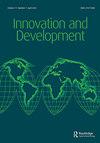发展中国家创客空间的常规创新成果与基层创新成果:菲律宾的治理及其决定因素
IF 1.7
Q3 DEVELOPMENT STUDIES
引用次数: 0
摘要
ABSTRACT Makerspaces(创客空间)被广泛认为是实现创新成果民主化的场所,从传统的企业家和科学精英的商业和教育议程转向草根和包容性议程。然而,创客空间既可以复制精英驱动的创新成果,也可以将其转化为草根议程,这在发展中国家的环境中最为明显。本研究基于对菲律宾 10 个选定 MS 的比较案例研究,探讨了 MS 之间创新成果的差异。所选案例从物质和文化两方面代表了会员国创新成果的异质性。研究发现了三种类型的创新成果,即以研究为基础的项目和精英文化、以商业为导向的项目和服务文化,以及创意和草根项目和创客文化。研究还发现,由东道组织的差异、微型企业的能力和集群的动态所决定的微型企业管理塑造了创新成果。研究强调,会员国的独立性、设计能力以及多样化和高技能的集群能最有效地促进草根创新成果。这项研究的主要贡献在于,它以实证研究的方式探讨了形成成员国不同创新成果的因素和动力。研究还讨论了对基层创新的政策影响。本文章由计算机程序翻译,如有差异,请以英文原文为准。
Conventional versus grassroots innovation outcomes in developing country makerspaces: governance and its determinants in the Philippines
ABSTRACT Makerspaces (MS) are widely considered to be sites for democratizing innovation outcomes away from conventional commercial and educational agenda of the entrepreneurial and scientific elite towards a grassroots and inclusive agenda. However, MS can reproduce elite-driven innovation outcomes as much as it can transform such towards a grassroots agenda, as is most evident in developing country contexts. Based on comparative case research of 10 selected MS in the Philippines, this study examines the variation of innovation outcomes among MS. Cases selected represent the heterogeneity of MS innovation outcomes in both material and cultural terms. The study finds three types of innovation outcomes that are research-based projects and elite culture, commercial-oriented projects and service culture, and creative and grassroots projects and maker culture. It further finds that MS governance, as determined by variation in host organizations, MS capabilities, and cluster dynamics, shape innovation outcomes. It highlights that grassroots innovation outcomes are most effectively facilitated by MS independence, design capabilities, and diverse and high-skilled clusters. The study’s main contribution lies in its empirical exploration of the factors and dynamics that shape diverse innovation outcomes in MS. Policy implications for grassroots innovation are discussed.
求助全文
通过发布文献求助,成功后即可免费获取论文全文。
去求助
来源期刊

Innovation and Development
Social Sciences-Cultural Studies
CiteScore
3.70
自引率
0.00%
发文量
24
期刊介绍:
conomic development and growth depend as much on social innovations as on technological advances. However, the discourse has often been confined to technological innovations in the industrial sector, with insufficient attention being paid to institutional and organisational change and to the informal sector which in some countries in the South plays a significant role. Innovation and Development is an interdisciplinary journal that adopts a broad approach to the study of innovation, in all sectors of the economy and sections of society, furthering understanding of the multidimensional process of innovation and development. It provides a forum for the discussion of issues pertaining to innovation, development and their interaction, both in the developed and developing world, with the aim of encouraging sustainable and inclusive growth. The journal encourages articles that approach the problem broadly in line with innovation system perspective focusing on the evolutionary and institutional structure of innovation and development. This focus cuts across the disciplines of Economics, Sociology, Political Science, Science and Technology Policy, Geography and Development Practice. In a section entitled Innovation in Practice, the journal includes short reports on innovative experiments with proven development impact with a view to encouraging scholars to undertake systematic inquiries on such experiments. Brief abstracts of degree awarded PhD theses in the broad area of concern for the journal and brief notes which highlight innovative ways of using internet resources and new databases or software are also published.
 求助内容:
求助内容: 应助结果提醒方式:
应助结果提醒方式:


